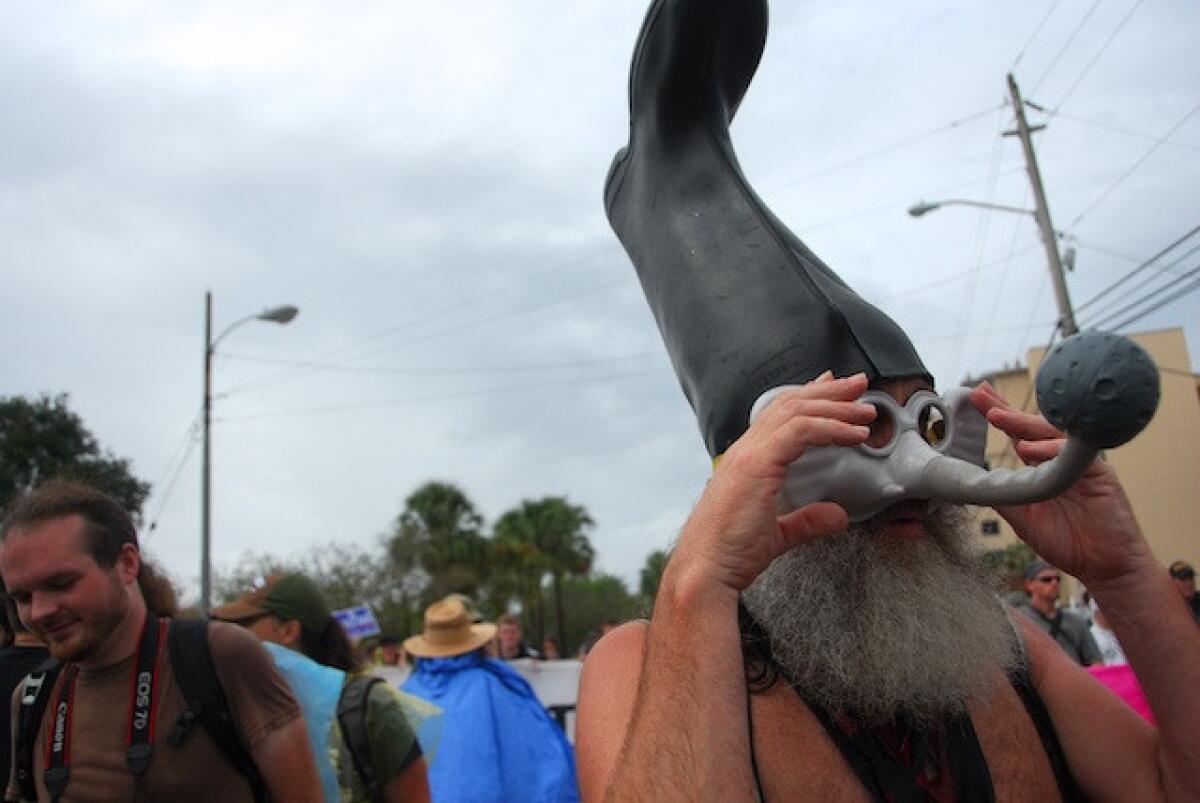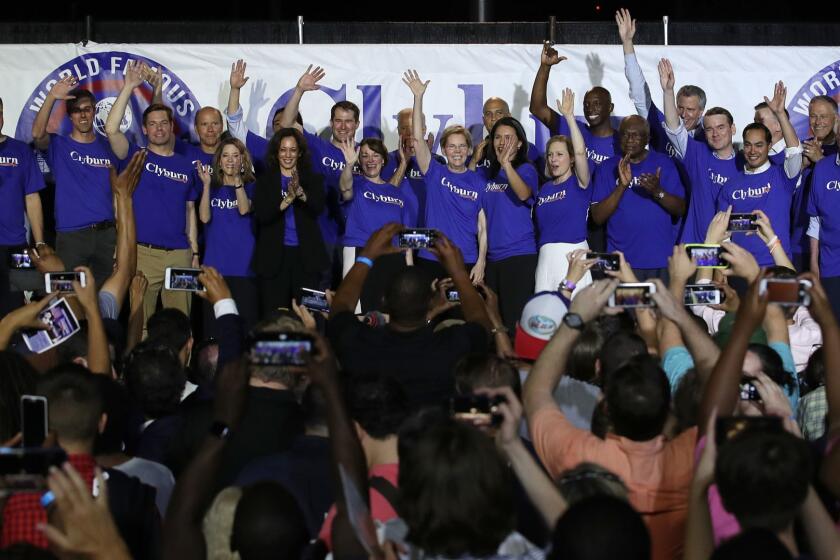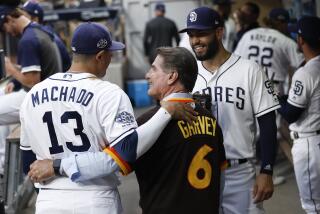More than 700 people have filed to run for president. Why?

There is just about every shade of politics you can imagine represented by the people who run for president.
There is Vermin Supreme, the perennial candidate who wears a boot for a hat and wants to give everyone free ponies. Or 89-year-old Mike Gravel, a former senator from Alaska who is allowing two teens to run his antiwar protest candidacy. And there’s Seven the Dog, whose principal campaign committee is the “Puppy Party — Friends of Seven the Dog.”
Yes, they all are running.
Including two dozen prominent candidates running for the Democratic nomination, more than 700 people have filed with the Federal Election Commission to run. (Some, we hope, are in jest, like Chocolate Pancakes of Manchester, Conn.)
Qualifying is easy — an individual must be at least 35 years old, a natural-born citizen and a U.S. resident for at least 14 years. Filing is a cakewalk — presidential hopefuls need to fill out a statement of candidacy with the FEC, which is free to do.
And so hundreds have filed: 279 as Democrats, 107 as Republicans, 34 as Libertarians, 156 as independents and others under names such as the Independent Conservative Democratic Party, American People’s Freedom Party or the George Wallace Party.
The majority are running long-shot campaigns most voters will never hear about. Some acknowledge they have little hope of gaining traction. Other candidates think, just maybe, there’s a shot that their message might catch on.
Twenty-four Democrats are vying to be the party’s nominee for president — that is, if we’re counting just the more prominent ones.
But it’s not likely. Those seeking the Democratic or Republican or third-party nominations must earn the support of delegates during state caucuses and primaries to have a shot at the national nominating convention. Candidates striking out on their own as independents must petition each state and Washington, D.C., to get on the ballot.
Many candidates say they are running solely to draw attention to issues such as the marginalization of Native Americans, taxation or promoting a progressive agenda. Others think the two-party system is damaging to the U.S. and want third parties to be a part of the election conversation.
Here are a few who have filed to run:
Dan ‘Taxation Is Theft’ Behrman
Dan Behrman wears a huge yellow hat decorated with bumper stickers reading “Taxation is theft.” The hat started as a gimmick, then became part of his campaign strategy, says Behrman, 38. Now, he wears it regularly when he hosts events, even to the airport.
“Don’t let the hat fool you,” he tweeted in June, “this is a serious campaign.”
The software engineer is running for the nomination of the Libertarian Party, which will pick its candidate in May at its national convention in Austin, Texas.
In 2014, Behrman ran as a Libertarian for the Texas House of Representatives against Democratic incumbent Justin Rodriguez; he got 23% of the vote.
Behrman said he decided to run for president because the country is divided and he believes his experience as a software engineer gives him a practical perspective on finding solutions “without shutting one side down.”
He supports “firing” the IRS, ending the war on drugs and eventually abolishing taxes, according to his website. The “digital nomad,” the site says, is “currently running his presidential campaign from Cancun, Mexico.”
Mark Charles
Mark Charles, a citizen of the Navajo Nation, is running as an independent. It has been more than 30 years since a prominent Native American has vied for the presidency.
Charles, 48, a public speaker based in Washington, D.C., announced his candidacy May 28. His campaign, he said, focuses on the marginalization of Native Americans by the federal government and on race, gender and class inequality in the U.S.
“Because we don’t know how to acknowledge our history, and the racism and the sexism and the white supremacy that’s embedded into our foundations, we don’t know how to solve the problems we’re facing today,” Charles said.
He proposes an agency similar to the truth and reconciliation commissions in Canada and South Africa, established to give citizens a chance to air grievances and hold officials responsible for change. He also wants to talk about the way indigenous people in the U.S. have been marginalized by the Doctrine of Discovery, a 15th century Catholic document that allowed Spaniards to claim indigenous land in the Americas.
Charles frames his campaign as an “18-month-long dialogue” to educate voters on American history through a Native American lens.
Crystal Bergfield
To run for president, Crystal Bergfield quit her part-time job in the Parks, Recreation and Libraries department of Westminster, Colo.
“For me, deciding to run was recognizing I have the skills, I have the courage, compassion and an innovative way of thinking,” said Bergfield, 36, who served in the Army as a unit supply specialist from 2004 to 2006.
She was medically discharged from the Army following a sexual assault incident, she said, and used the healing process to become a better leader. In January, she filed to run as an independent; she believes divisions in the country are exacerbated by the two-party system. She said she is running a “values-based” campaign and would hold appointed officials and federal employees to high standards and target government corruption.
She has six paid campaign staffers, and friends have volunteered to help where they can, she said.
Bergfield recognizes that she faces “an uphill battle” as an independent candidate. Yet, every morning, she says, she wakes up to meditate and spends that time deciding to give her time to her cause.
“For me, my eye is on being president.”
Mike Gravel
The truth is, Mike Gravel didn’t really want to run.
The former two-term Alaska senator, known for his antiwar and anti-imperialism platform, ran an unsuccessful bid for the 2008 Democratic nomination. He is perhaps better known for reading the Pentagon Papers aloud in 1971 into the public domain and breaking into tears.
He’s now retired, and he lives in Seaside, in Monterey County, with his wife and their 14-year-old dog.
But earlier this year, two teens from New York sent him a request: They wanted to support his 2020 run for the presidency. Gravel, who turned 89 in May, said no.
“Do you have any idea how old I am?” Gravel told David Oks and Henry Williams. But the two persisted, saying they researched Gravel thoroughly and only wanted to support his progressive platform.
It took them about a week and a half to change his mind, Gravel said. He was impressed by their thoroughness and commitment when they sent him a memo outlining his past positions on key issues.
“At this point, I said, ‘OK, you can file the exploratory papers, and you can use my Twitter account,’” Gravel recalled. By April 2, his statement of candidacy was filed with the FEC.
In June, the teens, Gravel and his Twitter account were profiled in the New York Times Magazine, in part for their effort in using political humor to elevate their cause.
“In an online world where everything is understood to be a performance, @MikeGravel looks us squarely in the eye and admits, ‘Every politician is just a bunch of kids in a trench coat — so why not make them actual kids?’” Jamie Lauren Keiles wrote.
The teens wanted Gravel to qualify for the Democratic National Committee’s second debate after missing the first one, in June. They managed to meet the 65,000-donor threshold after an assist from fellow candidate Marianne Williamson, who encouraged her supporters to contribute to help Gravel qualify. But the 89-year-old will not be on the debate stage. With the cap at 20 candidates and 21 qualifying, the Democratic National Committee gave more weight to those who meet a polling threshold.
Gravel has used the campaign to promote a book he is writing, “Human Governance,” about citizens setting up a process to vote and pass legislation without politicians, essentially creating a fourth branch of government.
But aside from that, the campaign is headed almost entirely by the two teens, who check in with him daily.
“They’ve been running the show,” Gravel said. “I’ve not lifted a finger.”
More to Read
Get the L.A. Times Politics newsletter
Deeply reported insights into legislation, politics and policy from Sacramento, Washington and beyond. In your inbox three times per week.
You may occasionally receive promotional content from the Los Angeles Times.












